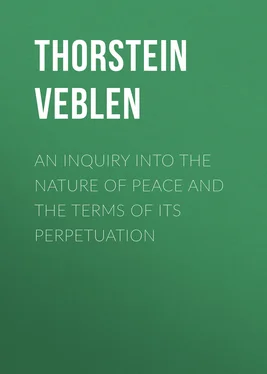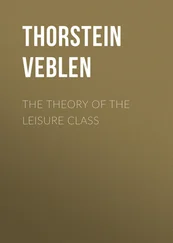Thorstein Veblen - An Inquiry into the Nature of Peace and the Terms of Its Perpetuation
Здесь есть возможность читать онлайн «Thorstein Veblen - An Inquiry into the Nature of Peace and the Terms of Its Perpetuation» — ознакомительный отрывок электронной книги совершенно бесплатно, а после прочтения отрывка купить полную версию. В некоторых случаях можно слушать аудио, скачать через торрент в формате fb2 и присутствует краткое содержание. Жанр: foreign_antique, Политика, Юриспруденция, foreign_edu, на английском языке. Описание произведения, (предисловие) а так же отзывы посетителей доступны на портале библиотеки ЛибКат.
- Название:An Inquiry into the Nature of Peace and the Terms of Its Perpetuation
- Автор:
- Жанр:
- Год:неизвестен
- ISBN:нет данных
- Рейтинг книги:5 / 5. Голосов: 1
-
Избранное:Добавить в избранное
- Отзывы:
-
Ваша оценка:
- 100
- 1
- 2
- 3
- 4
- 5
An Inquiry into the Nature of Peace and the Terms of Its Perpetuation: краткое содержание, описание и аннотация
Предлагаем к чтению аннотацию, описание, краткое содержание или предисловие (зависит от того, что написал сам автор книги «An Inquiry into the Nature of Peace and the Terms of Its Perpetuation»). Если вы не нашли необходимую информацию о книге — напишите в комментариях, мы постараемся отыскать её.
An Inquiry into the Nature of Peace and the Terms of Its Perpetuation — читать онлайн ознакомительный отрывок
Ниже представлен текст книги, разбитый по страницам. Система сохранения места последней прочитанной страницы, позволяет с удобством читать онлайн бесплатно книгу «An Inquiry into the Nature of Peace and the Terms of Its Perpetuation», без необходимости каждый раз заново искать на чём Вы остановились. Поставьте закладку, и сможете в любой момент перейти на страницу, на которой закончили чтение.
Интервал:
Закладка:
A corollary following from this general theorem may be worth noting in the same connection. Any politician who succeeds in embroiling his country in a war, however nefarious, becomes a popular hero and is reputed a wise and righteous statesman, at least for the time being. Illustrative instances need perhaps not, and indeed can not gracefully, be named; most popular heroes and reputed statesmen belong in this class.
Another corollary, which bears more immediately on the question in hand, follows also from the same general proposition: Since the ethical values involved in any given international contest are substantially of the nature of afterthought or accessory, they may safely be left on one side in any endeavour to understand or account for any given outbreak of hostilities. The moral indignation of both parties to the quarrel is to be taken for granted, as being the statesman's chief and necessary ways and means of bringing any warlike enterprise to a head and floating it to a creditable finish. It is a precipitate of the partisan animosity that inspires both parties and holds them to their duty of self-sacrifice and devastation, and at its best it will chiefly serve as a cloak of self-righteousness to extenuate any exceptionally profligate excursions in the conduct of hostilities.
Any warlike enterprise that is hopefully to be entered on must have the moral sanction of the community, or of an effective majority in the community. It consequently becomes the first concern of the warlike statesman to put this moral force in train for the adventure on which he is bent. And there are two main lines of motivation by which the spiritual forces of any Christian nation may so be mobilised for warlike adventure: (1) The preservation or furtherance of the community's material interests, real or fancied, and (2) vindication of the national honour. To these should perhaps be added as a third, the advancement and perpetuation of the nation's "Culture;" that is to say, of its habitual scheme of use and wont. It is a nice question whether, in practical effect, the aspiration to perpetuate the national Culture is consistently to be distinguished from the vindication of the national honour. There is perhaps the distinction to be made that "the perpetuation of the national Culture" lends a readier countenance to gratuitous aggression and affords a broader cover for incidental atrocities, since the enemies of the national Culture will necessarily be conceived as an inferior and obstructive people, falling beneath the rules of commonplace decorum.
Those material interests for which modern nations are in the habit of taking to arms are commonly of a fanciful character, in that they commonly have none but an imaginary net value to the community at large. Such are, e.g., the national trade or the increase of the national territory. These and the like may serve the warlike or dynastic ambitions of the nation's masters; they may also further the interests of office-holders, and more particularly of certain business houses or businessmen who stand to gain some small advantage by help of the powers in control; but it all signifies nothing more to the common man than an increased bill of governmental expense and a probable increase in the cost of living.
That a nation's trade should be carried in vessels owned by its citizens or registered in its ports will doubtless have some sentimental value to the common run of its citizens, as is shown by the fact that disingenuous politicians always find it worth their while to appeal to this chauvinistic predilection. But it patently is all a completely idle question, in point of material advantage, to anyone but the owners of the vessels; and to these owners it is also of no material consequence under what flag their investments sail, except so far as the government in question may afford them some preferential opportunity for gain,—always at the cost of their fellow citizens. The like is equally true as regards the domicile and the national allegiance of the businessmen who buy and sell the country's imports and exports. The common man plainly has no slightest material interest in the nationality or the place of residence of those who conduct this traffic; though all the facts go to say that in some puzzle-headed way the common man commonly persuades himself that it does make some occult sort of difference to him; so that he is commonly willing to pay something substantial toward subsidising businessmen of his own nationality, in the way of a protective tariff and the like.
The only material advantage to be derived from such a preferential trade policy arises in the case of international hostilities, in which case the home-owned vessels and merchants may on occasion count toward military readiness; although even in that connection their value is contingent and doubtful. But in this way they may contribute in their degree to a readiness to break off peaceable relations with other countries. It is only for warlike purposes, that is to say for the dynastic ambitions of warlike statesmen, that these preferential contrivances in economic policy have any substantial value; and even in that connection their expediency is always doubtful. They are a source of national jealousy, and they may on occasion become a help to military strategy when this national jealousy eventuates in hostilities.
The run of the facts touching this matter of national trade policy is something as follows: At the instance of businessmen who stand to gain by it, and with the cordial support of popular sentiment, the constituted authorities sedulously further the increase of shipping and commerce under protection of the national power. At the same time they spend substance and diplomatic energy in an endeavor to extend the international market facilities open to the country's businessmen, with a view always to a preferential advantage in favor of these businessmen, also with the sentimental support of the common man and at his cost. To safeguard these commercial interests, as well as property-holdings of the nation's citizens in foreign parts, the nation maintains naval, military, consular and diplomatic establishments, at the common expense. The total gains derivable from these commercial and investment interests abroad, under favorable circumstances, will never by any chance equal the cost of the governmental apparatus installed to further and safeguard them. These gains, such as they are, go to the investors and businessmen engaged in these enterprises; while the costs incident to the adventure are borne almost wholly by the common man, who gets no gain from it all. Commonly, as in the case of a protective tariff or a preferential navigation law, the cost to the common man is altogether out of proportion to the gain which accrues to the businessmen for whose benefit he carries the burden. The only other class, besides the preferentially favored businessmen, who derive any material benefit from this arrangement is that of the office-holders who take care of this governmental traffic and draw something in the way of salaries and perquisites; and whose cost is defrayed by the common man, who remains an outsider in all but the payment of the bills. The common man is proud and glad to bear this burden for the benefit of his wealthier neighbors, and he does so with the singular conviction that in some occult manner he profits by it. All this is incredible, but it is everyday fact.
In case it should happen that these business interests of the nation's businessmen interested in trade or investments abroad are jeopardised by a disturbance of any kind in these foreign parts in which these business interests lie, then it immediately becomes the urgent concern of the national authorities to use all means at hand for maintaining the gainful traffic of these businessmen undiminished, and the common man pays the cost. Should such an untoward situation go to such sinister lengths as to involve actual loss to these business interests or otherwise give rise to a tangible grievance, it becomes an affair of the national honour; whereupon no sense of proportion as between the material gains at stake and the cost of remedy or retaliation need longer be observed, since the national honour is beyond price. The motivation in the case shifts from the ground of material interest to the spiritual ground of the moral sentiments.
Читать дальшеИнтервал:
Закладка:
Похожие книги на «An Inquiry into the Nature of Peace and the Terms of Its Perpetuation»
Представляем Вашему вниманию похожие книги на «An Inquiry into the Nature of Peace and the Terms of Its Perpetuation» списком для выбора. Мы отобрали схожую по названию и смыслу литературу в надежде предоставить читателям больше вариантов отыскать новые, интересные, ещё непрочитанные произведения.
Обсуждение, отзывы о книге «An Inquiry into the Nature of Peace and the Terms of Its Perpetuation» и просто собственные мнения читателей. Оставьте ваши комментарии, напишите, что Вы думаете о произведении, его смысле или главных героях. Укажите что конкретно понравилось, а что нет, и почему Вы так считаете.












